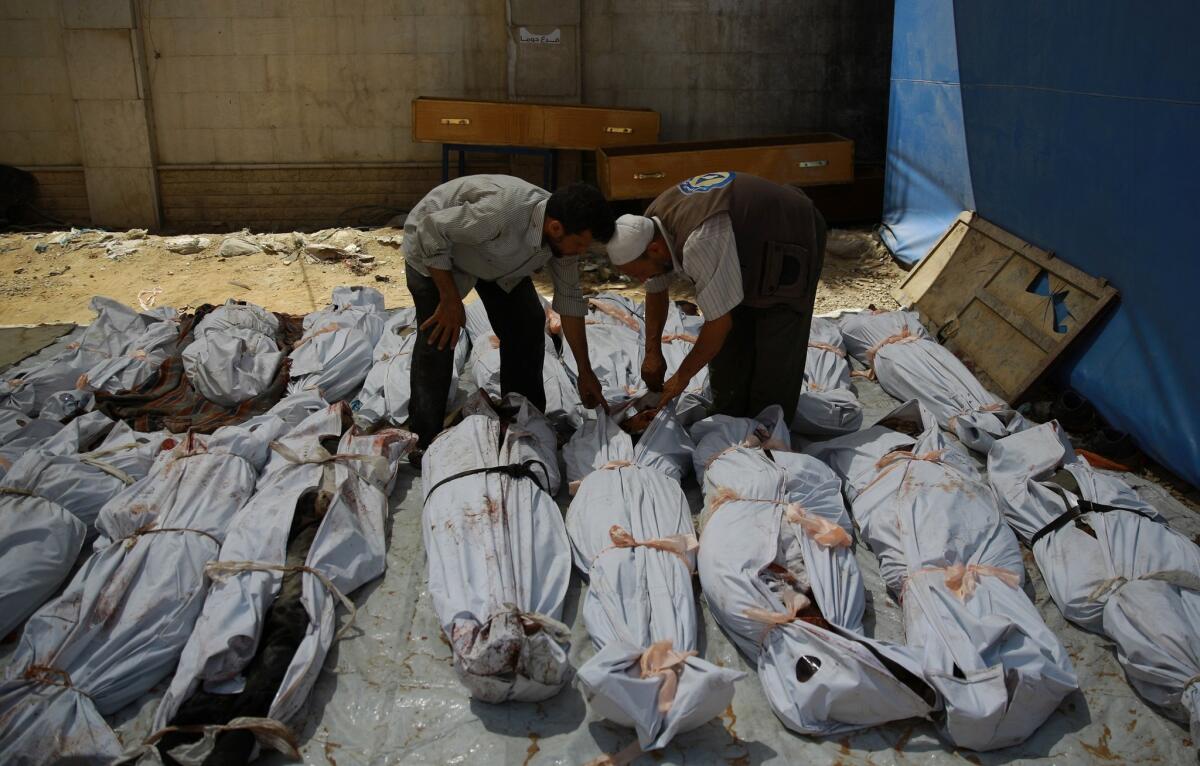Syrian rebels fire rockets, mortar shells into Damascus; at least five dead

A Syrian emergency worker and a civilian inspect the bodies wrapped in plastic bags outside a makeshift hospital in the rebel-held area east of the capital Damascus, following reported airstrikes by regime forces on Aug. 12, 2015, that reportedly killed at least 27 people. The attack came after rebel rocket and mortar fire hit Damascus.
- Share via
Reporting from Beirut — Rebels lobbed dozens of rockets and mortar rounds into Damascus on Wednesday, official and opposition media said, as Iran’s top diplomat arrived in the Syrian capital for talks with officials of President Bashar Assad’s government.
Meanwhile, both sides in the Syrian conflict reportedly agreed on a limited truce that would allow opposition fighters to exit Zabadani, a Damascus suburb that has been under government siege for weeks. The deal would facilitate delivery of humanitarian aid to a pair of loyalist towns cut off by rebel forces in northwest Syria.
Syrian state media reported five people were killed and 55 wounded in the opposition barrage on Damascus, which is under tight government control. An opposition-aligned watchdog group, the Syrian Observatory for Human Rights, put the death toll at 13.
Islamist rebels based in nearby suburbs regularly shell Damascus, Assad’s seat of power. Such attacks inevitably result in retaliatory strikes.
Military warplanes retaliated Wednesday with airstrikes on a number of rebel-held suburbs, killing 27 people and wounding more than 120, according to the Syrian Observatory group.
Both sides in the Syrian conflict regularly engage in bombardment that mostly results in civilian deaths, according to human rights activists.
Wednesday’s opposition barrage on Damascus unfolded on a day when Iranian Foreign Minister Mohammad Javad Zarif met with Assad. Iran has been a major financial and military backer of the Syrian president’s embattled administration.
The meeting comes amid a flurry of diplomatic activity aimed at ending the more than four-year conflict, which has left much of Syria in ruins, killed more than 200,000 people and spawned the growth of new opposition militant groups such as Islamic State, an Al Qaeda breakaway faction. A year ago, the United States launched an air war against Islamic State, but the group still controls considerable territory in Syria and neighboring Iraq.
Syria has become the site of a raging proxy war that features government-backed forces, supported by Iran and Russia, facing off against mostly Islamist rebels backed by Saudi Arabia, Turkey, the United States and other nations. Any diplomatic solution probably will require the agreement of outside powers, experts say.
The U.S., Russia, Iran and other nations are reported to be trying to devise a new diplomatic initiative on Syria, though its shape remains uncertain.
The Iranian foreign minister, in a news conference following his meeting with Assad, said his discussions had centered on resolving the crisis in Syria.
“It is high time for the other players and our neighbors to care about the facts and submit to the demands of the Syrian people,” said Zarif.
The comment was widely viewed as a barb aimed at regional powerhouses Saudi Arabia and Turkey, both major backers of the Syrian armed opposition.
Earlier in the day, the Lebanese Al-Manar news channel reported that Zarif, before visiting Damascus, had met in Beirut with Hassan Nasrallah, leader of Hezbollah. The Shiite Muslim militant faction, a staunch ally of Assad, has played an instrumental role in bolstering the Syrian military against rebels, who are mostly Sunni Muslims, the majority sect in Syria.
Hezbollah has spearheaded a weeks-long offensive to retake the Damascus suburb of Zabadani, a onetime resort town close to the Lebanese border turned rebel stronghold.
Last month, United Nations special envoy Staffan de Mistura accused government forces of inflicting “unprecedented levels of destruction and many deaths” on Zabadani’s civilian population through the deployment of so-called barrel bombs, crude ordinance made by packing explosives into metal tubes.
On Wednesday, however, both government and opposition sources reported Hezbollah and other pro-government forces had agreed to a 48-hour cease-fire with Ahrar Al-Sham, an Al Qaeda-linked faction that is the largest rebel force in Zabadani.
The reported truce also extends to the mostly Shiite towns of Kefraya and Fuaa, pro-government enclaves in northwest Idlib province, which is largely under rebel control.
Rebels have long besieged the two towns, forcing the army to bring in supplies via helicopter airlift. In recent days, Sunni Islamist opposition factions have stepped up bombardment of Kefraya and Fuaa in what they have called retaliation for the government attacks against Zabadani.
A reported deal would allow opposition fighters to leave Zabadani and would permit the delivery of humanitarian aid to Kefraya and Fuaa
Special correspondent Bulos reported from Istanbul, Turkey and Times staff writer McDonnell from Beirut.
Follow McDonnell on Twitter at @mcdneville for news out of the Middle East
More to Read
Sign up for Essential California
The most important California stories and recommendations in your inbox every morning.
You may occasionally receive promotional content from the Los Angeles Times.










